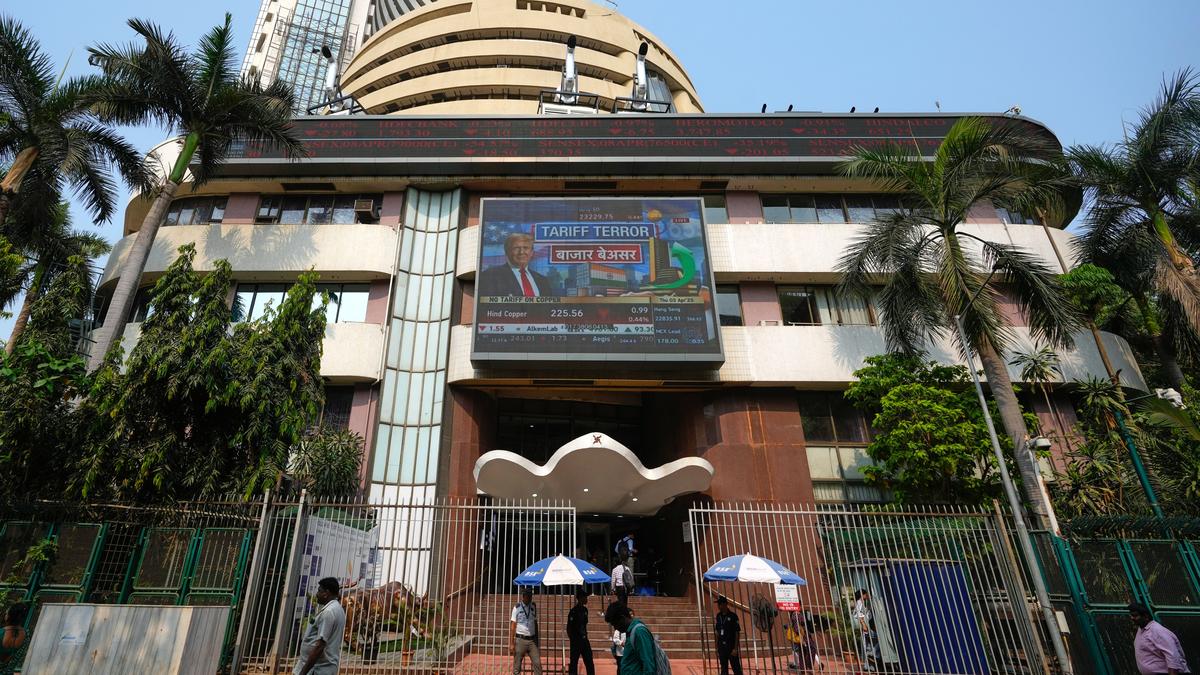News of tariff hikes announced by U.S. President Donald Trump is seen on a display screen on the facade of the Bombay Stock Exchange (BSE) building in Mumbai on April 3, 2025.
| Photo Credit: AP
Noting that U.S. President Donald Trump’s new tariffs are tantamount to a total disregard of the World Trade Organisation (WTO), the Sangh Parivar’s (RSS) economic wing said on Thursday (April 2, 2025) that India should follow suit, and also “dump” the Trade-Related Aspects of Intellectual Property Rights (TRIPS).
TRIPS is the WTO’s comprehensive multilateral agreement on intellectual property, not always weighted in favour of developing nations.

Swadeshi Jagaran Manch (SJM) economist and co-convenor Ashwani Mahajan told The Hindu that India has paid a heavy cost for complying with these international agreements that the U.S. now seems to be discarding.
‘TRIPS is inhuman’
“What we see is a total disregard of the WTO. We signed WTO, and we were given higher bound tariffs for the reason that we had accepted, the TRIPS, TRIMS, services and agriculture in General Agreement on Tariffs and Trade (GATT), and the agreement on TRIPS had cost us heavily in terms of outgo of royalty. We have approximately gone from negligible amount of royalty to $17 billion dollars plus,” said Mr. Mahajan.
“We can also disregard WTO and dump TRIPS. Maybe it’s too early to say this, but if WTO doesn’t exist, then why should TRIPS? TRIPS as an agreement is inhuman. For example, we had pleaded with developed countries to keep medications for COVID outside of TRIPS but they did not agree. It was clearly all for profit. If the West can be so sensitive towards their profits, why should we not be sensitive vis a vis our humanitarian needs?” Mr. Mahajan asked.
‘Silver lining’
The trade tariffs announcement, dubbed “Liberation Day” by Mr. Trump, may have a “silver lining” for India, Mr. Mahajan said. “If we look at the list of countries tariff-wise, our number comes at 19th, and China is 11th, I believe. There is a difference of around 8% between India and China. So [between] India and China, who are the main competitors so far as the U.S. markets are concerned — may it be chemicals or other kinds of products, and despite the fact that Indian industries have not been able to compete in India, but they compete in U.S. — we may get a relative advantage,” he said.

“We see a silver lining in this relative difference, that India would gain market access in the U.S. more than it had before these Trump tariffs were announced. Say, if Chinese products become 34% costlier, Indian products will be 26% costlier,” he said.
‘Protect farm, dairy sectors’
He did, however, strike a note of caution on market access with regard to agriculture, dairy and small scale industries. “The Indian government should continue efforts to protect agriculture and issues of livelihood,” he said.
Mr. Mahajan added that, unless India imposed retaliatory tariffs, he did not see prices getting hit in India. “So far as the Indian government’s mindset is concerned, they are ready to tweak tariffs on automobiles, especially electric vehicles, and these are not in competition with Indian automobile manufacturers. In U.S. certainly, I forsee inflation, as they have imposed tariffs across the board,” he said.
Published – April 03, 2025 07:57 pm IST
